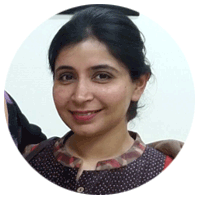Top 10 Bone Marrow Transplant Hospitals in India
A bone marrow transplant (BMT) involves replacing the damaged or diseased bone marrow of the patients using healthy blood-forming stem cells. This is a complex and highly specialized procedure used for the treatment of disorders related to blood and marrow along with certain blood cancers such as leukemia and lymphoma.
Key points about BMT:
- Leukaemia causes more deaths in children than any other cancer.
- Cancer treatment methods such as radiation and chemotherapy often result in killing the cancer cells, but in the process it may also destroy the patient’s healthy Bone Marrow cells.
- Bone marrow transplant can be a life saving therapy for many patients with leukaemia, lymphoma, or another blood cancer. It is possibly the one cure for some diseases.
- The goal of BMT is to reboot or restart the immune system in a person whose bone marrow has been damaged by cancer treatment therapies or due to a disease.
- It involves transfusion of bone marrow stem cells collected from blood or marrow of the patient only or from a matched donor (parent, sibling, other close relative)
- Used as treatment of some rare diseases: Stem cell transplant for treatment of scleroderma
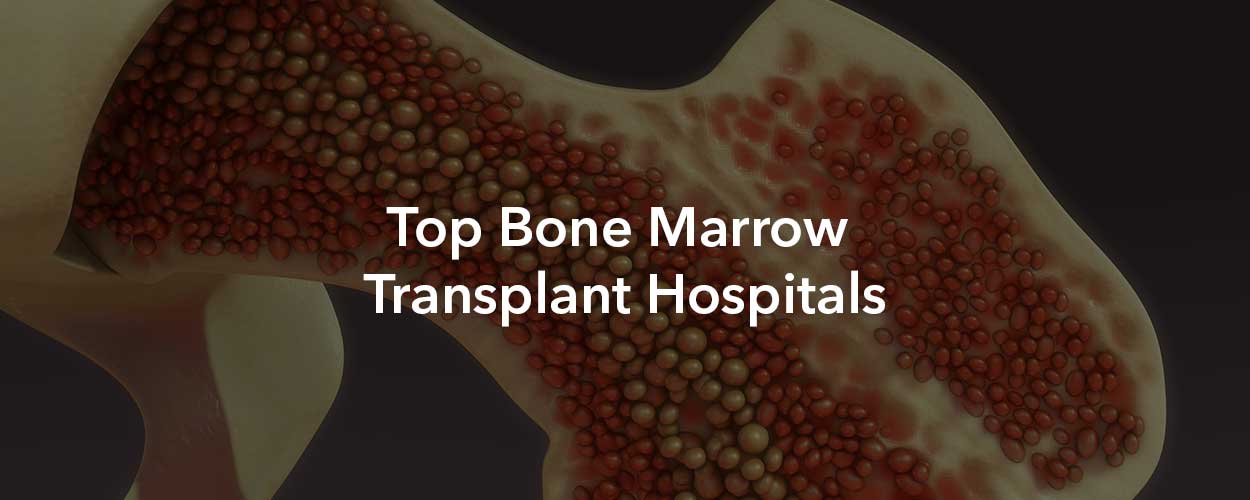
The bone marrow is the soft, spongy fatty tissue found in the inner part of the bones. It contains specific type of stem cells that are capable of producing different types of blood cells including red blood cells, white blood cells and platelets. These are the cells that are needed for a bone marrow transplant.
The bone marrow is essentially of two types: red marrow and yellow marrow. Children’s marrow mostly contains red marrow, which is rich in stem cells. Where in adults, the marrow is mostly converted into yellow marrow because of infiltration of fat cells. The stem cell rich red marrow in adults is usually restricted to certain bones including the hip bones, breast bone, ribs, backbone, shoulder blades, skull, and the ends of the arm and thigh bones.
The stem cells for BMT can be harvested from either the patient’s own bone marrow (autologous transplant) or from a donor (allogeneic transplant), usually a close relative (parent or sibling). Depending on the availability, other sources such as stem cells from cord blood saved after birth of a baby or cells from a half-matched donor (Haplo-allogeneic transplant) are also considered for a BMT.
Connect with Experts & Get a Free Personalized Quote from Best Bone Marrow Transplant Hospital in India
Why is BMT needed?
A bone marrow transplant can be used in case of the following:
- To treat bone marrow diseases that affects the production of blood cells such as aplastic anemia, thalassemia and others.
- Regenerate the immune system after treatment with high-dose chemotherapy with or without radiation to kill cancer such as myeloma, Acute myeloid leukemia and others
- Replace bone marrow in people with genetically unhealthy or non-functional bone marrow, such as in the case of sickle cell anemia.
- Reboot the immune system in patients with severe autoimmune deficiency or inherited metabolic disorders.
Why choose to have Bone Marrow Transplant treatment in India?
Indian medical centres are recognized all over the world for their quality of services and hospitality. BMT treatment is offered by many of the top hospitals in Delhi, Chennai, Hyderabad, Bangalore and Mumbai. All these cities are easily accessible through the major international airlines of a number of countries.
Getting a medical treatment in India can be considered the best choice because:
- A number of hospitals in India have multiple accreditations from nationally and internationally renowned organizations such as JCI, NABH, ISQua and many others. These accreditations provide assurance for the best quality of patient services and treatment in the country.
- The skills and expertise of the doctors is one of the major reasons for which people choose India. A bone marrow transplant procedure in India is performed by a multidisciplinary team of specialists, including hematologists, hemato-oncologists, medical oncologist, radiation oncologist, pediatric hematologists and others.
- Economical healthcare packages for treatment of various kinds of medical problems is a major attraction for overseas patients. A person travelling to India on a medical visa can save considerable amount of money for the same treatment in other countries, such as the UK and USA.
- Availability of top-class infrastructure and latest medical technology is also a reason for India’s popularity as a medical tourism destination. The high-tech tools and equipments for bone marrow transplant procedures allow the doctors to perform the procedure with greater accuracy and give excellent results.
What are advanced facilities used at top Bone Marrow Transplant hospitals in India?
The hospitals in India are highly advanced medical facilities equipped with the latest Innovations in the field of medicine. This is a major contributor for the high success rate of bone marrow transplant in India. Some of these advanced services are:
- Haploidentical (Haplo-allogeneic) bone marrow transplants allows the use of stem cells from donors who are partial matches to the patient. With further technological advancement, the doctors can now perform such procedure with lesser risk of complications and better recovery for patients.
- Reduced-intensity conditioning with the use of lower dose chemotherapy and radiation before the stem cell transplantation. These conditioning regimens allow older patients and those who aren’t healthy enough for a high dose conditioning to undergo transplant process. Best BMT hospitals in Gurgaon such as FMRI uses lymphoablative drugs, example – Cyclosphosphamide and ATG, for conditioning.
- Cord blood transplant is a type of bone marrow transplant method in which stored and frozen umbilical cord blood is used. The stem cells from cord blood are lesser in number than those collected from bone marrow. However, use of cord blood cells reduces the risk of rejection or graft-versus-host disease.
- Extensive research work and clinical trials for the use of bone marrow transplant as a treatment for a number of other complicated and rare diseases.
Best Bone Marrow Transplant Hospitals in India
| Hospital | Rating | |
|---|---|---|
| 1 | Fortis Memorial Research Institute, Gurgaon | 4.9 |
| 2 | Medanta – The Medicity, Gurgaon | 4.9 |
| 3 | Indraprastha Apollo Hospital, Delhi | 4.9 |
| 4 | Max Super Speciality Hospital, Delhi | 4.9 |
| 5 | Dharamshila Narayana Super Specialty Hospital | 4.9 |
| 6 | BLK Super Speciality Hospital | 4.9 |
| 7 | BGS Gleneagles Hospital, Bangalore | 4.8 |
| 8 | Wockhardt Hospital North Mumbai | 4.8 |
| 9 | Kokilaben Dhirubhai Ambani Hospital, Mumbai | 4.8 |
| 10 | Gleneagles Global Health City | 4.8 |
1. Fortis Memorial Research Institute, Gurgaon
Opposite HUDA City Centre, Sector 44, Gurugram, Haryana – 122002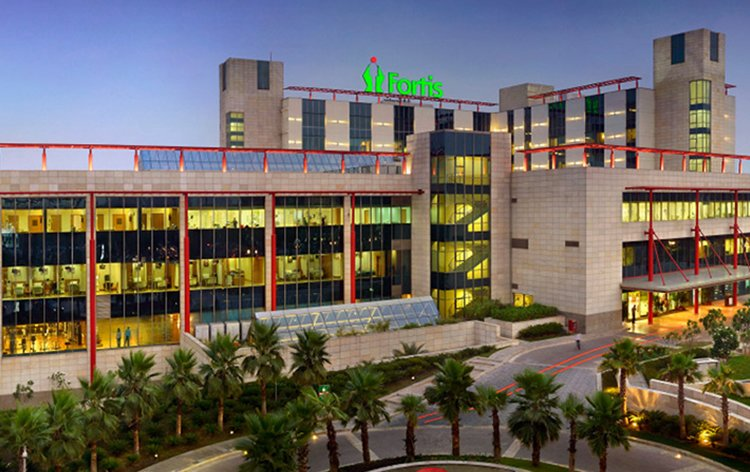
- The Institute of blood disorders and Bone Marrow Transplant at Fortis Memorial Research is a world-class facility that provides efficient care to patients who need a hematopoietic stem cell transplant.
- The super-speciality institute is a forerunner in the treatment of hematological disorders, such as Leukaemia, Aplastic Anaemia, Lymphatic and Solid malignant tumours.
- The centre offers bone marrow transplant with autologous cells or allogeneic cells to adults, infants, children and adolescents with malignant or non-malignant blood related diseases.
- The BMT department at FMRI provides reliable medical care and meets international criterion for BMT performance.
- The multidisciplinary team at the centre, including haematologists, hemato-oncologists and bone marrow transplant team, provides effective treatment and comprehensive care for the treatment of multiple myelomas, lymphomas, paediatric bone marrow transplant, and thalassemia transplant etc.
- FMRI offers treatment with BMT for specific and rare diseases which can not be managed by other treatment options, such as Hematopoietic Stem Cell Transplant for Multiple sclerosis (MS).
Salient features:
- The department has some of the best bone marrow transplant doctors in India headed by Dr. Rahul Bhargav, a prominent name in the field of bone marrow transplant
- Over 800 bone marrow transplants performed
- A 22-bedded transplant unit for intensive care of the BMT patients
- One of the largest medical facilities for treatment of multiple sclerosis, sickle cell and aplastic anaemia treatment
- International standard for infection control practices
- Among the few centres that offer matched unrelated donor transplant for thalassemia patients
- Haploidentical transplant offered with 40 percent long-term outcome data
- Cater to patients across various countries and the first Indian hospital to conduct a BMT transplant for patients from Trinidad & Tobago
2. Medanta – The Medicity, Gurgaon
CH Baktawar Singh Road, Sector 38, Gurugram, Haryana – 122001
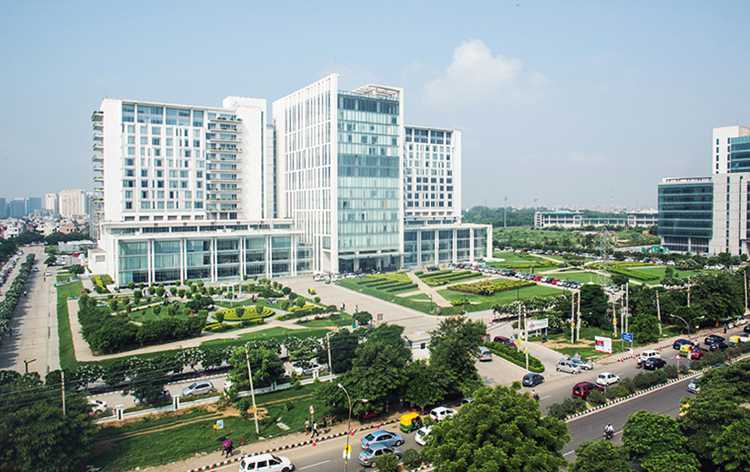
- Medanta is an internationally accredited multi-super specialty hospital that offers a wide range of healthcare services and facilities.
- Bone Marrow Transplant program at Medanta is one of the premier institutes that offers best BMT treatment in India to treat people suffering from blood disorders and cancers.
- The hospital has one of the most renowned pediatric BMT programs in the country, which involves specialists such as Dr. Satya Prakash Yadav, one of the most experienced and prominent pediatric hematologists in India. Hundreds of transplants are performed for children under this program, including several half-matched donor transplants.
- The specialized centre for BMT has rooms fitted with HEPA filters and laminar air flow to prevent risk of infection in patients.
- The centre has 1:1 patient to nurse ratio with nurses being specially trained to care for immunocompromised patients.
- Top-notch blood bank services at Medanta provide all kinds of blood products for BMT procedures along with stem cell harvesting.
Salient features:
- The Division of Medical Oncology and Haematology at Medanta Cancer Institute uses holistic approach for treatment of different types of cancers including blood malignancies.
- Advanced diagnostic facilities including PET-CT scanning, 3 Tesla MRI, Flow Cytometry, Immunohistochemistry and Molecular Diagnostics.
- Full-fledged laboratories services for haematology, microbiology and biochemistry testing and facilities for cryopreservation of cells.
- Integrated network of different specialists working together to manage all kinds of complications.
- Prominent hematologist of India work at Max Hospital, including Dr. Ashok Kumar Vaid (Chairman, Medical and Haemato Oncology), Dr. Nitin Sood (Associate Director, Medical and Haemato Oncology) and Dr. Satya Prakash Yadav (Director – Pediatric Hemato-oncologist)
3. Indraprastha Apollo Hospital, Delhi
Sarita Vihar, Delhi Mathura Road, New Delhi – 110076
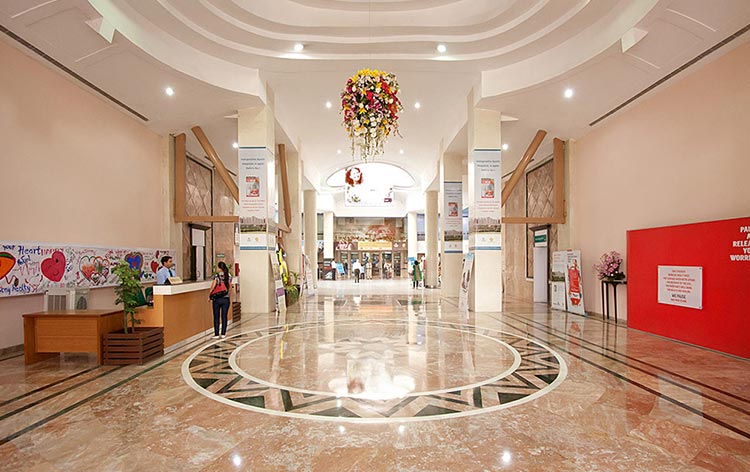
- Apollo Hospitals is a leading healthcare group in the world with Indraprastha Apollo being its flagship hospital and a top-tier bone marrow transplant hospital in New Delhi.
- The blood and bone marrow transplantation center at Apollo Hospitals offers wide-ranging, coordinated and patient services for treatment of blood disorders in adults and children with an excellent success rate.
- The hospital is favourable choice of destination for many foreign patients as it provides reliable and affordable BMT treatment in India.
- The centre houses a team of highly qualified BMT specialists including specialists such as hemato-oncologists, pediatric hematologists, cancer surgeons along with specialized nursing staff to provide effective medical care to the patients.
- The hospital has a stringent infection control protocol for BMT patients to ensure excellent postoperative care and eradicate chances of infection.
Salient features:
- Over 1500 transplants have been conducted at Apollo Hospitals
- The Apollo BMT centre strives to provide the best facilities for the treatment & management of benign and malignant hematological disorders with top-class hematological laboratory and blood transfusion services.
- The BMT team at Indraprastha Apollo includes renowned names, such as Dr. Shishir Seth.
4. Max Super Speciality Hospital, Delhi
Press Enclave Road, Mandir Marg, Saket, New Delhi – 110017
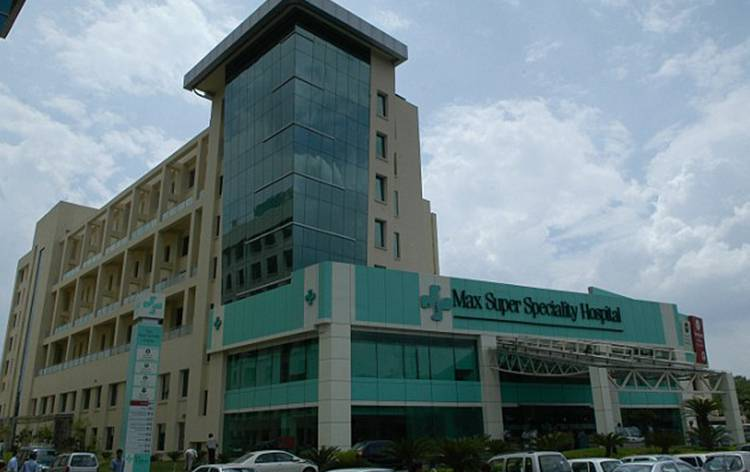
- Max Super Speciality Hospital, Saket is a renowned quaternary care medical facility and is considered one of the best BMT hospitals in New Delhi.
- The Department of Haematology and Bone Marrow Transplant at Max hospital offers first-rated BMT treatment with autologous, allogeneic, unrelated and mismatched and other types of bone marrow transplants.
- The high-end facility is designed with international standard of safety and infection management policies. It is outfitted with High-Efficiency Particulate Air filter (HEPA filter) for protection from various infectious agents.
- Backed by internationally renowned Haematologists, the department has a good expertise in treating paediatric as well as adult patients with benign and malignant disorders of blood and bone marrow.
Salient features:
- The Bone Marrow Transplant unit offers best bone marrow transplantation in India for different kinds of hematological conditions, including both benign and malignant diseases in children and adults.
- The state-of-art haematopathology set-up at Max has ultra-modern instruments including highly advanced flow cytometry machine.
- A well-established blood bank facility at Max offers special services for BMT procedures such as platelet apheresis, plasmapheresis, leukapheresis and stem cell harvest.
5. Dharamshila Narayana Super Specialty Hospital
Vasundhara Enclave, Near New Ashok Nagar Metro Station, Dallupura, New Delhi, Delhi – 110096
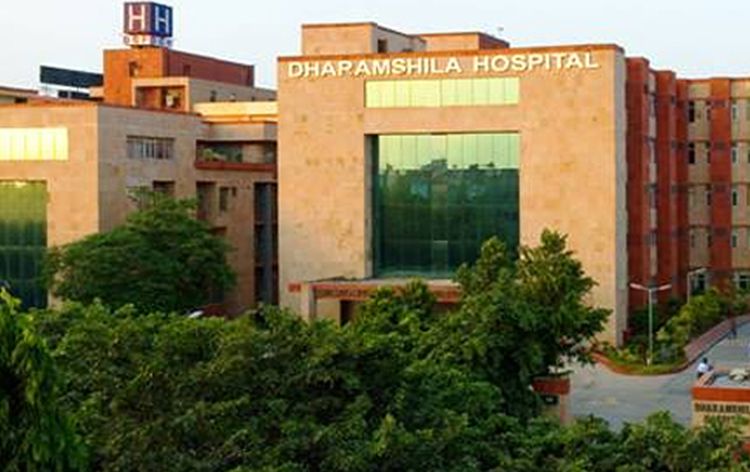
- The Bone Marrow Transplant Centre at Dharamshila Narayana Superspeciality Hospital offers wide ranging clinical services for treatment of malignant and non malignant blood diseases in children and adults.
- The Centre is highly acclaimed for its path breaking research in the field of half-matched HLA family donors (haploidentical transplants).
- The department provides integrated, personalised and coordinated medical services for diagnosis, treatment and long term follow-up to ensure the best possible clinical outcome.
- Being a dynamic, efficient and self-reliant center, DNSH remains at the forefront of new methods and advancements in the field of haematology with a holistic care approach.
Salient features:
- Performed over 100 Haploidentical transplants with excellent clinical outcome in most complex cases of refractory leukaemia, lymphoma and severe aplastic anaemia.
- A 21-bed facility for special care of patients with haematological disorders. The unit has four isolated rooms and 17-bedded isolation ward to provide barrier nursing and protect patients who are on immunosuppressive medication from different types of infections.
- The only BMT unit in India to be made as per standards of class 1000 clean room followed internationally with
- Boasts of a disease-free-survival rate of over 70% in malignant diseases and more than 80% for non-malignant diseases.
- The facility is equipped with diagnostic equipment such as X-ray machine, ultrasound scan, dialysis machine and a ventilator.
- The expert team at Dharamshila Narayana Superspeciality Hospital has won laurels for their clinical practice and research work in India and abroad, including the BMT Tandem Meetings in the United States of America for 4 consecutive years from 2015 onwards.
Connect with Experts & Get a Free Personalized Quote from Top Bone Marrow Transplant Hospitals in India
6. BLK Super Speciality Hospital
Pusa Rd, Radha Soami Satsang, Rajendra Place, New Delhi, Delhi 110005
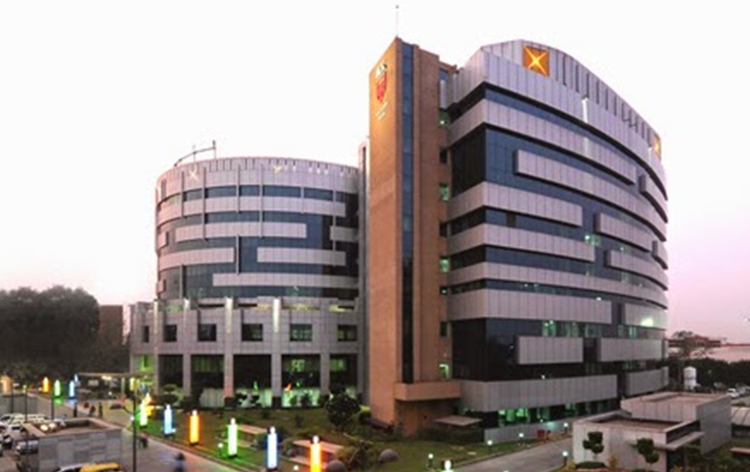
- BLK Super Speciality Hospital has its name amongst the top-tier hospitals in New Delhi that offers a comprehensive range of services across various specialties.
- The BLK Centre for Bone Marrow Transplant is not only one of the largest in India but also amongst the largest in Asia.
- Being a dedicated specialized facility, the centre is designed as per the international standard and follows stringent infection control protocol for management after treatment care to sensitive patients.
- The BMT centre is linked to a high-end laboratory services, blood bank for transfusion services, and well established radiation oncology unit to provide comprehensive cancer treatment with total body irradiation.
- Services offered at the hospital include allogeneic bone marrow transplant and autologous bone marrow transplant with cells from bone marrow, peripheral blood stem cells or cord blood stem cells for treatment of various benign and malignant blood disorders.
Salient features:
- BMT centre at BLK Hospital is credited with more than 1000 transplants
- BLK Centre for Bone Marrow Transplant is credited to be the First MUD (Match Unrelated Donor) Transplant in Delhi
- It is one of the largest and first of its kind centres across Asia
- The centre has conducted the maximum number of transplants in north India
- Transplants are routinely performed for pediatric and adult patients
- Every room in the unit has separate HEPA filter with triple level of air filtration
7. BGS Gleneagles Hospital, Bangalore
67, Uttarahalli Main Rd, Sunkalpalya, Kengeri, Bengaluru, Karnataka 560060

- BGS Gleneagles Hospital is a premier healthcare service provider brand in India. It is known to be one of the largest and best bone marrow transplant hospitals in Bangalore.
- The hospital is credited for its achievement of being the first hospital to perform dual organ transplantation (liver & kidney) as well as the successful simultaneous pancreas and kidney transplant surgery in Karnataka.
- The Department of Bone Marrow Transplant at Gleneagles Global Hospital is a centre of excellence that provides superior quality of services and care to patients with blood and marrow disorders, for adults as well as pediatric.
- The hospital offers allogeneic and autologous bone marrow transplant with excellent clinical outcomes and at an affordable bone marrow transplant cost in India.
- Such achievements are possible due to their wide range of medical treatment through its up-to-date technology, state-of-the-art infrastructure and experienced staff as well as emergency services around the clock.
Salient features:
- There are 14 operation theatres fitted with updated technology and HEPA filters for infection control.
- BGS Gleneagles Global Hospital is the first hospital to be recognized for their extensive research and development by the Government of India.
- The hospital has a team of the best hematologists in Bangalore working in collaboration with highly qualified nurses and other specialists with a good experience in this field of work.
8. Wockhardt Hospital North Mumbai
The Umrao IMSR Near Railway Station, Mira Road (E) Dist. Thane , Mumbai, MH, India, 401107
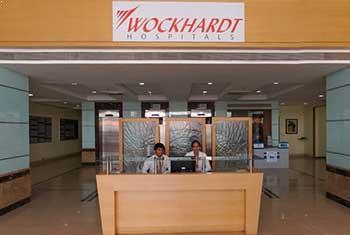
- Wockhardt Hospital Mira Road is one of the best BMT hospitals in Mumbai that caters patients from all around the world.
- The hospital has one of its kind advanced haematology department where different types of bone marrow transplant procedures, including both autologous and allogeneic bone marrow transplant, are offered with good success rates.
- The 14 storied hospital building is located at a prime location in Mumbai that is easily accessible through various transportation modes. The hospital has a top-grade infrastructure and offers a number of medical amenities to ensure maximum comfort of the patient.
Salient features:
- Wockhardt hospital is fitted with the latest and first-class facilities related to bone marrow transplant (BMT).
- There is a special ward dedicated to patients with neutropenia who are more prone to developing infections after transplant. Trained nurses and specialists cares for patients in this ward to prevent or manage complications.
- The best BMT doctors in Mumbai are part of the Hematology department at Wockhardt. These specialists have vast experience and expertise in the field of Bone marrow transplant and managing complex blood cancer cases.
9. Kokilaben Dhirubhai Ambani Hospital, Mumbai
Rao Saheb Achutrao Patwardhan Marg, Four Bunglows, Andheri (West), Mumbai – 400053
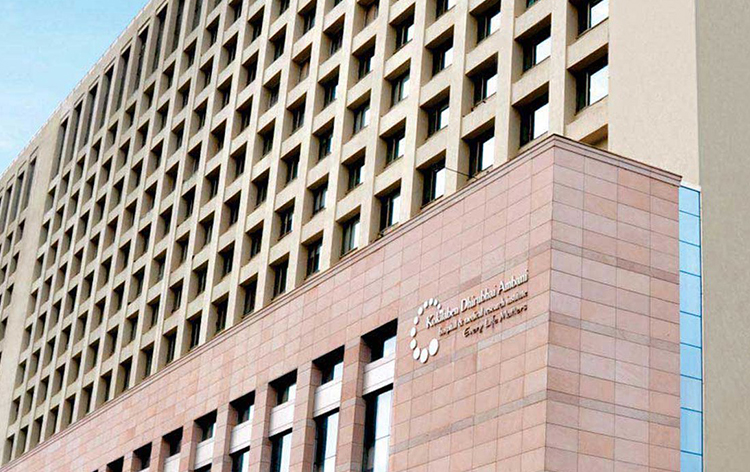
- Kokilaben Dhirubhai Ambani hospital is an internationally acclaimed hospital with multiple accreditation and awards for its superlative quality of healthcare services.
- The Bone Marrow Transplant unit at Kokilaben is a highly specialized and dedicated centre that offers a high standard of clinical care and support to ensure safety as well as the success of the procedure.
- The program provides transplant as a treatment option for paediatric and adult patients who are suffering from acquired or congenital disorders of blood and bone marrow.
- The hospital is known to be one of the best Bone Marrow Transplant hospitals in India that delivers best possible treatment with high success and patient satisfaction rates.
Salient features:
- The BMT unit is equipped with HEPA filters to keep the air within the unit free of microorganisms. The centre is designed to ensure maximum post treatment care and prevention of infections.
- At Kokilaben Hospital, a highly qualified multidisciplinary team comprising of haematologists and paediatric haemato-oncologists specializes in different types of bone marrow transplant procedures, such as allogeneic and autologous bone marrow, peripheral BMT and umbilical cord blood transplants, among others.
10. Gleneagles Global Health City
439, Medavakkam Road, Perumbakkam, Cheran Nagar, Chennai, Tamil Nadu 600100
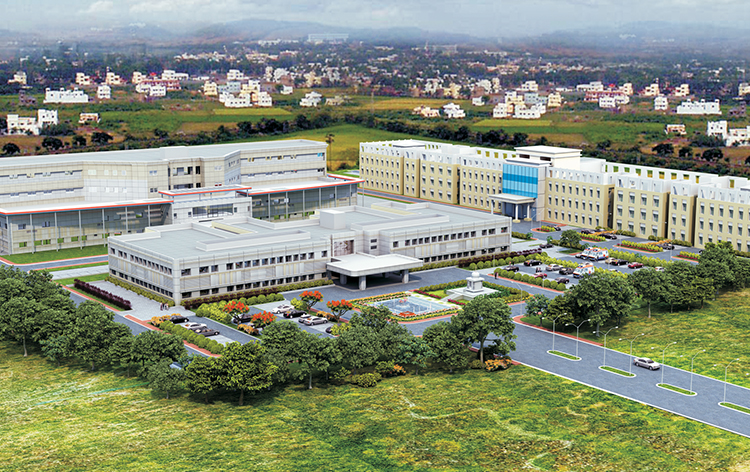
- Gleneagles Global Hospitals Chennai is one of the largest hospitals of the Gleneagles Global Group and ranks top amongst the best bone marrow transplant hospitals in Chennai.
- The hospital brings together a combination of high-end medical facilities and clinical expertise of the top BMT specialists at the most competitive cost of bone marrow transplant in Chennai.
- The dynamic team of experts at Global Hospital include best hematologists in Chennai who specialize in the treatment of blood cancers and diseases with bone marrow transplant procedures.
- The hospital is well-known for delivering reliable and quality medical care to patients with blood cancers or other disease that affects the bone marrow structure and functioning.
Salient features:
- The hospital is fitted with the advanced diagnostic and therapeutic techniques which enables the doctors to provide effective and successful treatment to patients.
- An experienced and dedicated medical staff along with top hematologists ensure that people with blood cancers and diseases receive compassionate and reliable care.
- The high-tech laboratories with next-generation equipment and blood transfusion facilities are available at Gleneagles Global Hospital Chennai.
Other Questions about BMT:
What is the cost of bone marrow transplant in India?
The bone marrow transplant cost in India ranges from USD 18000 – 35000. It may vary depending on the type of transplant recommended for treatment and many other factors.
Major factors that play an important role in determining the cost of BMT in India:
- The type of transplant: there are three main types of bone marrow transplants. Autologous transplant costs less as compared to allogeneic transplant as with allogeneic BMT the addition cost for donor’s tests, facilities, lab work and recovery are also included. Haplo-Allogeneic (Haploidentical) Bone marrow transplant cost is also higher because the procedure is more complicated and the number of tests also increases.
- The health condition: The type of cancer or disorder for which BMT is recommended you have you’ll be recommended a type of transplant.
- Age of the patient: This impacts the overall bone marrow transplant cost. The treatment cost for pediatric patients or under the age of 20 is higher as their care and duration of stay in the hospital is usually higher.
- Chemotherapy sessions and pre-transplant tests:In the case of cancer, cycles of chemotherapy are administered as part of conditioning regime. This also impacts the overall cost of BMT treatment. A number of tests and evaluations are carried out for the patients as well donor (for allogeneic transplant) that can increase the cost.
Cost of autologous bone marrow transplant in India: USD 18000 – 22000
Cost of allogeneic bone marrow transplant in India: USD 25000 – 35000
Other factors that can vary the BMT cost in India:
- Location and quality of the hospital
- Duration of hospital stay
- Room category
- Doctor’s skills and experience
- Additional complications and medications required for their management
What are the conditions that can be treated with BMT?
- Aplastic anemia
- Sickle Cell Disease
- Immuno-deficiency Disorders
- Thalassemia
- Autoimmune Diseases
- Acute Myeloid Leukemia
- Acute Lymphoblastic Leukemia
- Multiple Myeloma
- Clotting and Bleeding Disorders
- Paediatric Solid Tumours (Ewings / Osteosarcomas / Neuroblastomas)
- Autism
- Scleroderma
What is the procedure for bone marrow transplantation?
There are three main steps involved in a bone marrow transplantation process.
First step is the collection of bone marrow or stem cells, also called harvesting from the patient or the donor or the umbilical cord.
Next is the conditioning procedure in which the existing bone marrow is completely destroyed by chemotherapy and ablative procedures. This clears out the deceased or faulty bone marrow of the patient and prepares them to receive the new stem cells.
Then the bone marrow transplant is carried out by infusing the stem cells intravenously, like a blood transfusion. The new bone marrow may not show indications of growing for two to three weeks, or may take a few months before the infused bone marrow cells produce all the blood cells in an adequate amount.
How are stem cells collected?
There are two methods used for harvesting stem cells:
Peripheral blood stem cell donation (PBSC) donation: This is a less invasive procedure and the most common method for collecting stem cells. The method is also called apheresis.
Few days before the extraction, the person goes from therapy for mobilization of stem cells into the bloodstream. This involves giving injections of a drug which increases the number of cells in the blood that are used for transplant.
The blood is then taken out through a needle in one arm and passed through a machine that segregates different types of blood cells including stem cells. The stem cells are separated and the remaining blood is returned to the body through the other arm. Now a days, most bone marrow transplant donations are done using this method.
The process is usually completed within 3 hours and may be repeated on the second donation day. There are some mild side effects, including headaches, bone soreness, and discomfort from the needle during the process.
Bone marrow donation: This is less commonly used method and involves surgery. The procedure is usually performed on an outpatient basis. The donor is administered an anesthesia for the operation. The doctor withdraws the liquid marrow from the back of the pelvic bone using a needle. The donors are usually able to go home the same day of the procedure and return to normal activity almost 1 week after the surgery.
Some of the common side effects for this procedure are mostly related to anaesthesia and include nausea, headache, and fatigue.
Frequently Asked Question about Bone Marrow Transplant
Special cells known as stem cells have the capacity to multiply and transform into the various cell types that your body requires. Different types of stem cells can be found in various regions of the body at different times.
Bone marrow is a soft, spongy substance in the body that includes hematopoietic stem cells. The majority of bones include it in the middle. There are hematopoietic stem cells in the blood that circulate throughout your body as well.
Stem-cell transplantation, also known as bone marrow transplantation, can be a life-saving operation for people with a variety of conditions, including non-malignant blood disorders like sickle cell disease as well as blood malignancies like leukemia and lymphoma.
The numbing medication will be injected, and you will experience a strong sting. The pain from the biopsy needle may also be transient and dull. This examination could be painful because the inside of the bone cannot be numbed.
The pain may or may not linger for a week. It’s crucial to remember to keep the site dry and clean following the biopsy in order to prevent heavy lifting from opening the wound.
The life expectancy following a bone marrow transplant varies depending on the patient’s health.
After a hematopoietic cell transplant, patients who were able to survive for at least 5 years without experiencing any symptoms of the original disease have a higher chance of living for an additional 15 years.
Inevitably non-cancerous illness patients benefit from transplants far more, with survival rates of between 70% and 90% with a matched sibling donor and between 36% and 65% with unrelated donors.
Many stem cell transplant recipients openly mark Day 100 as the pivotal day in their recovery on their calendars. At that point, the danger of serious side effects is at its lowest and the stem cells have engrafted and started producing new blood cells.
Avoid these foods (unsafe):
- Poultry or cold meat.
- Fresh eggs.
- Ill-cooked eggs, such as those with runny yolks and sunny-side-up.
- All miso products, including paste and soup, as well as cold soups and gazpacho.
- Pomegranate and grapefruit (including juice)
- Alcohol.
- Raw foods.
- 4-day-old leftovers.
The list of changes in the diet and food consumption is shared by the doctor/hospital based on a patient’s health and individual needs.
The one-year survival rate for transplants using unrelated donors has grown from 42% to 60% over the last five years and is now on par with rates for transplants using family members as donors. Because many patients now obtain transplants earlier in the course of their disease, survival rates are also greater for many patients.
India is a fantastic option for a bone marrow transplant due to its affordability and reliability. among the best bone marrow transplant hospitals in India, with a startling 60–90% success rate.
If the patients are going home following a transplant, the house needs to be well-cleaned before the patient gets there. A mild solution of bleach and water should be used to clean the kitchen and bathroom spaces. Additionally, wash the patients’ blankets, comforters, and towels as well as all of their bed linens.
For the first few weeks after one gets back, the house must be cleaned at least once every week. Vacuuming, dusting, and intensive cleaning of the kitchen and bathrooms should all be included in this weekly cleaning.
Patients can spend a few weeks in the hospital after a stem cell transplant. The specific circumstances, like how quickly the blood cells heal and how well people are, will determine this. In certain cancer treatment facilities, patients might spend some of this time at home or in a hotel close to the facility.
Most likely, one won’t need to stay in the hospital for more than three weeks. One might stay in the hospital for four weeks or more if the stem cells were an allogeneic transplant from another individual.

Written By Vanshika Rawat
Vanshika Rawat is an experienced content developer. She is very knowledgeable in the field of science and healthcare and has worked under brilliant scientists during her higher education. Vanshika obtained her degrees in Masters in Science and Bachelors in Science (Microbiology with Hons.) from renowned institutions - Panjab University and University of Delhi.